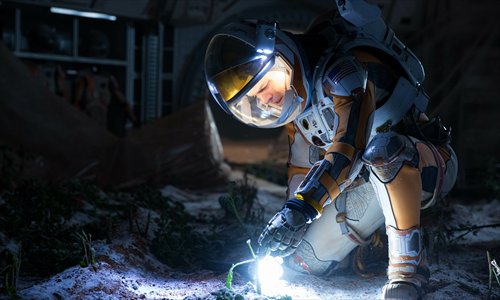Serious about science
‘The Martian’ thrills with story instead of dazzling effects

A still from The Martian, starring Matt Damon. Photo: AFP
After Saving Private Ryan (1998) and Interstellar (2014), Matt Damon lost again. This time on Mars. The Martian, sort of a sci-fi Robinson Crusoe on Mars, premiered in Beijing on Friday. While The Martian was one of the most highly anticipated sci-fi films for many Chinese audiences this year, after the release of Gravity (2013) and Interstellar the film doesn't feel as visually impressive as it may have if it had come out a few years earlier. However, The Martian does impress with an honest and straightforward story that doesn't rely on the usual sci-fi cliches and instead gets audiences to focus on what sci-fi films should really be about: The spirit of discovery.
Good story-telling
Adapted from Andy Weir's eponymous novel, The Martian tells the story of Mark Watney, a NASA astronaut who is left behind on Mars after an unexpected sandstorm forces his team to return to Earth. Although the story may look simple and even a bit flat at first glance, what unfolds is a riveting and oft-times humorous story of one man's struggle to survive on another planet.
Many who read the original novel worried that the book's first-person perspective was going to be difficult to adapt to the screen, especially considering the number of internal monologues the main character has throughout the story. The film deftly adapts these to the silver screen by having Watney record a video diary of himself - a move that allows the film to retain the humorous nature of the character, which many fans of the original novel feel is one of the book's highlights.
While Ridley Scott is famous for his stunning visuals in movies such as sci-fi greats Alien (1979) and Blade Runner (1982), moviegoers heading to The Martian expecting huge visual displays may feel a little disappointed, as the visuals are similar to Gravity. Instead the director's focus is clearly on Watney and telling an honest and convincing sci-fi story.
This emphasis on story-telling versus dazzling special effects was certainly a conscious decision on the part of director Ridley Scott. At a press conference in Beijing on Friday morning, the director pointed out that the key to a good sci-fi film today lies in how to slow down the tempo and tell a good story, since the visual and technical sides of these types of films are no longer the obstacles they once were.
Matt Damon's one-man show on Mars is a joy to watch. Although the star's character finds himself in an exaggerated situation, the acting is far from exaggerated, nor does it try to go out of its way to pull on the heartstrings. There are several story beats in the film that the director could have chosen to focus on, such as Watney's loneliness or his connection to his distant family, similar to what happened to the similarly trapped Ryan Stone (Sandra Bullock) in Gravity. Instead the film seems solely interested in sharing some serious knowledge about science with the audience.
A smart film for smart audiences
Showing Watney's determination to keep trying to find solutions to problems despite how many times he may fail, the film does a perfect job of portraying the character's temperament and emotional presence, while also getting the audience interested in how Watney will find his way out of a particular predicament.
This isn't to say that the film doesn't attempt its share of emotional moments. For instance, after Mark is successfully rescued, the cheering crowds from all over the world do come across as trying to fan the audience's excitement a little, but these moments are short and concise and don't go out of their way to try and manipulate the feelings of the audience.
When it comes to the science portrayed in the story, the film does a great job explaining things to the audience in an easy to understand way, instead of making the film a work meant only for sci-fi enthusiasts or engineers. Elaborating on details such as how to plant potatoes on Mars and how to calculate the precise time and distance between a space ship and the planet, the film doesn't treat the audience like hopeless idiots. Although, you can still miss some points when it comes to the more complicated astrophysics if you don't pay attention.
Forced Chinese elements
For audiences watching the film in China, the biggest thing that detracts from the film, like many other Hollywood blockbusters in recent years, lies with the forced introduction of Chinese elements. When Chinese actress Chen Shu's proud and melodious voice announced that their research will be NASA's only chance to save Watney, it came across as more of a joke than patriotic and the audience here in China couldn't help but laugh out loud.
These blatant attempts at appeasing the Chinese market stick out like a sore thumb. It seems that Hollywood still has a lot to learn when it comes to making their attempts to attract Chinese audiences feel more natural and logically fitting in with the story.